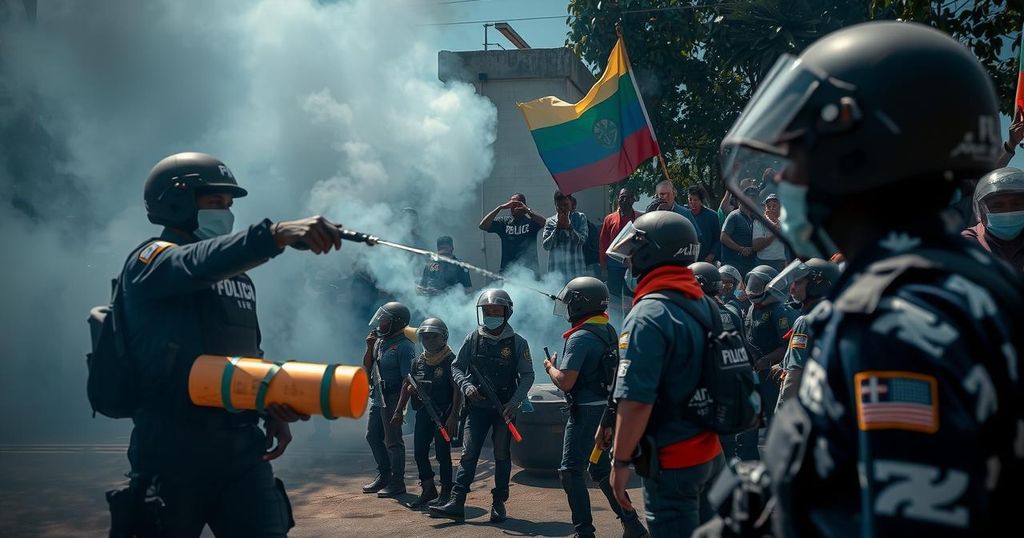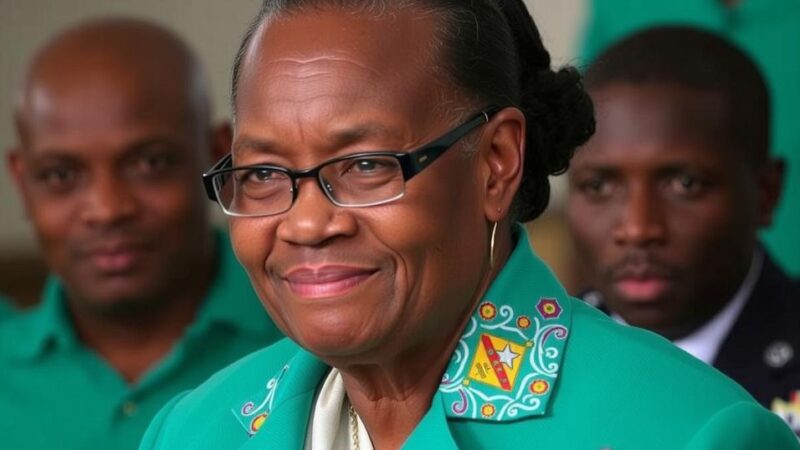Police in Mozambique deployed tear gas against protesters in Maputo amid unrest over disputed October 9 election results, which the opposition claims were marred by fraud. The protests led to at least 18 deaths and significant security measures by authorities. Opposition leader Venancio Mondlane described the situation as pivotal for the nation, prompting international calls for restraint from law enforcement and adherence to human rights standards.
In Maputo, Mozambique, police have resorted to employing tear gas against demonstrators protesting the electoral results of the October 9 elections. The protest attracted thousands of individuals who accused the ruling FRELIMO party of committing electoral fraud, an assertion that has triggered widespread unrest resulting in the deaths of at least 18 individuals. Election results showed FRELIMO’s Daniel Chapo receiving 70.67% of the vote, while his main challenger, independent candidate Venancio Mondlane, secured 20.32%. The opposition party, RENAMO, trailed with Ossufo Momade receiving 5.81% of the votes. Reports of heightened security measures included police and military patrolling the streets, dispersing crowds and maintaining order. Concerns over escalating violence prompted statements from international bodies, notably the United Nations, emphasizing the necessity for law enforcement to adhere to human rights standards. Opposition leader Mondlane characterized the nation as being at a pivotal juncture, expressing a sentiment of revolutionary potential among the people. This unrest has further affected economic activities, resulting in a suspension of port operations due to border closures between Mozambique and South Africa, although some crossings have since reopened. The recent events in Mozambique underscore significant political turmoil following an election perceived as unfair by opposition groups. Demonstrations erupted as citizens expressed their dissatisfaction with the election results and the ensuing violence, highlighting a growing demand for accountability and transparent governance. Amid claims of fraud and the involvement of security forces, the situation remains tense, prompting calls for serious political discourse and reform. According to Volker Türk, the United Nations High Commissioner for Human Rights, police action should prioritize minimum force, reinforcing international human rights obligations. As citizen unrest continues, the call for a historic political transition resonates louder among opposition leaders and supporters alike. At this critical juncture in Mozambique’s political landscape, the implications of the post-election scenario extend beyond immediate violence, indicating deeper systemic issues that call for attention. Addressing the root causes of this unrest is essential for stabilizing the nation and fostering a democratic environment conducive to political dialogue and reform. The constitutional mandate to uphold the rule of law and protect human rights remains paramount in guiding the state’s response to these demonstrations, as the international community observes the developments that unfold. This situation echoes a broader context of electoral integrity and citizen engagement in governance, significant for both Mozambique’s present and future.
The protests in Mozambique arise from a contentious electoral process, specifically the results of the October 9 elections, where allegations of fraud emerged against the ruling FRELIMO party. The opposition expressed severe discontent, asserting that the reported election outcomes were fabricated. The political landscape is marked by tensions between FRELIMO and opposition parties such as RENAMO and Podemos, which have raised their voices against perceived injustices. This civil unrest is further complicated by security measures taken by authorities to quell demonstrations, raising questions about the government’s commitment to human rights and democratic principles. As violence mounts and protests intensify, the international community is closely monitoring the situation, particularly in regard to the treatment of citizens by law enforcement agencies and the political dialogue moving forward.
In conclusion, the ongoing protests in Mozambique highlight a significant crisis stemming from disputed election results and allegations of electoral fraud by authorities. The use of force by police against demonstrators, resulting in casualties, underscores a troubling pattern of state response to civil dissent. The insistence from opposition leaders on the need for reform resonates with a populace eager for accountability and change. As the international community watches closely, Mozambique stands at a crucial crossroads, necessitating immediate dialogue to address the deep-rooted issues underlying this unrest and striving towards a more transparent and democratic governance framework.
Original Source: www.dw.com







